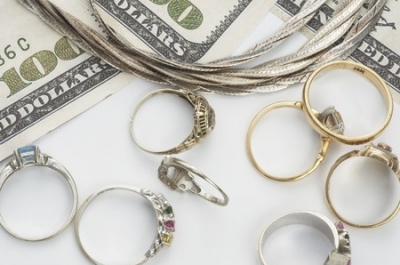Need Extra Money this Summer? Consider a Pawn Loan
If you need some extra money this summer, one option that has increased in popularity is to sell valuable jewelry or coins at a pawn shop. But what if you don’t want to part permanently with your cherished belongings? A pawn loan may be the answer.

Before you enter into a loan agreement with a pawn shop, make sure you do your homework regarding the shop, and understand how the loan works. Here’s an overview:
Pawn Loans — All About Convenience
Many people feel a sentimental attachment to a piece of jewelry. They may want to keep it as an investment or bequeath it to their children. A pawn loan is a quick and easy alternative to selling. Pawn shop loans are not only a fast way to get cash, they are also easier than a bank loan, as a credit check and co-signer is generally not required. The transaction is usually straightforward: A pawn broker will determine the value of the item you are leaving as collateral, such as a gold necklace. The amount you receive is based on the appraised value of your piece — not your credit rating or other variable. If you agree to the price and terms and conditions, you will receive cash in the amount of the agreed upon loan. You can usually get cash within minutes. Also, if you decide not to repay the loan, your credit score will not be affected. The broker will simply keep and resell the item on loan.
It’s common knowledge that banks have tightened their lending standards over the last few years, so, for many, a pawn loan is a viable option to a traditional loan.
Length of a Pawn Loan
Pawn shops vary, but most pawn loans are two or three months, along with a grace period.
Once you repay the loan in full, including interest, you receive your property back. If you do not repay the loan within the time set forth in the terms, the collateral then becomes the property of the pawn shop. You may also have the option of applying for a loan extension or renewal.
Loan Extensions and Renewals
Many pawn shops offer extension and/or renewal periods. With an extension, you may extend the length of your loan, as allowed by state law. Most pawn shops will require you to pay a portion of the interest owed.
Another option is a loan renewal. You pay the accrued interest on the loan, and a new loan is written. The original (principal) amount of the loan and the interest rate stay the same, but the due date of the loan is reset to the beginning.
What to Know Before You Pawn
Before agreeing to a pawn shop loan, do your research. Is the pawn or jewelry store reputable? Can you talk to or read testimonials from satisfied customers?
Make sure the pawn shop is licensed and regulated by the state and/or local authorities. Also ask if the pawn shop is insured and your item will be locked up and safe. Before you get your item appraised, be sure the appraiser is properly trained and experienced. Finally, make sure you understand how the appraiser determined the appraisal value of the item and all the terms and conditions of the loan.
